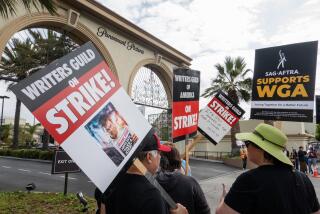Gorbachev Sees Vein of Opportunity to Be Mined From Worker Unrest
- Share via
The spring and early summer of 1989 have been times of political and social turmoil in the Soviet Union. Yet, while many have been treating the latest round of coal strikes as the beginning of the end for perestroika, the labor unrest is actually being used by Mikhail S. Gorbachev to accelerate economic reform.
The coal strikes do not come as a surprise. Only 20% of the regional Communist Party leaders were defeated in the elections of March 26, but candidates from the coal-mining regions were particularly vulnerable. Then the extremely poor conditions in the coal fields were the subject of heated speeches at the televised Congress of People’s Deputies that met in late May and early June. That workers would follow up with action of their own was a natural development.
The strikes, however, are far more than a traditional call for higher wages. The key demands are usually those associated with management--higher prices, with local mines receiving a proportion of the hard currency earned by the sale of their coal abroad. When the miners say they support perestroika , they don’t just mean the right to strike. They are calling for radical economic reform.
The cause of the miners’ concern is obvious. In the crazy-quilt system of Soviet pricing, coal is one of the items that is sold below cost to other factories. So long as the miners are paid wages out of the state budget, they don’t care about prices. But with the new laws calling for self-financing (the payment of costs out of receipts), abnormally low coal prices mean a cut in wages to miners.
The crucial fact about the coal strikes is not that they occurred, but that they have received so much attention--often sympathetic--in the controlled Soviet media. The reason is that they could not come at a better time: the eve of a major Central Committee plenum on nationalities.
The plenum will deal first with decentralization of authority to the Soviet republics. As such, Russians are uneasy that Gorbachev is being too weak with the non-Russians and making too many concessions to them. The coal strike gives Gorbachev the ability to say that this decentralization is being demanded by Russians, too--and by one of the core elements of the old working class. It also will legitimatize a continuation of the very thorough purge of conservatives that he has been conducting over the last year.
We in the West desperately need to keep these events in perspective. For four years a number of observers have been saying that Gorbachev is teetering, that he is riding an uncontrollable tiger. As proof, they cite each incident of turmoil.
Yet every serious Western analysis--and surely the Soviet leaders themselves understand this point--notes that political reform will produce additional tensions to keep the political caldron boiling.
The question has always been: Would this be the kind of escalating tension and political activity that has toppled many authoritarian regimes around the world and brought political democracy? Or would it be the kind of political turmoil we saw in America and Western Europe in the 1960s that would subside with time and a change in policy?
In my view the latter is the case. Gorbachev is not riding a tiger. He is a Cossack firmly in control of his horse as he moves through tough terrain.
Paradoxically, the saving factor for Gorbachev is the nationality conflict. The non-Russians are divided and can be controlled through a combination of concessions and repression. The first big riots--and bloodshed--occurred in Kazakhstan in 1986, when a Russian was named first secretary of that republic’s Communist Party. Yet he proved a skillful leader; last March, virtually none of 25 top leaders lost in the Kazakh elections.
The Russians in turn can be restrained by appeals to national unity. The Siberian workers or Moscow students know that if they successfully push for complete democracy, separatist parties will emerge everywhere and some areas will leave the union. They are not ready for this.
That is why Gorbachev can afford to publicize the strikes and the national demands in such an apparently reckless manner. The non-Russians will get the greater autonomy they seek, and that will help pacify them. The Russians too will get greater local independence and a rising standard of living.
But the non-Russians making the most extreme demands will be kept in check. The troops will be called out periodically, as was the National Guard in America in the 1960s. This does not mean the system is collapsing or reform is over. The sky is not falling. We have to get on with developing a policy, not dreaming that it will.
More to Read
Sign up for Essential California
The most important California stories and recommendations in your inbox every morning.
You may occasionally receive promotional content from the Los Angeles Times.











